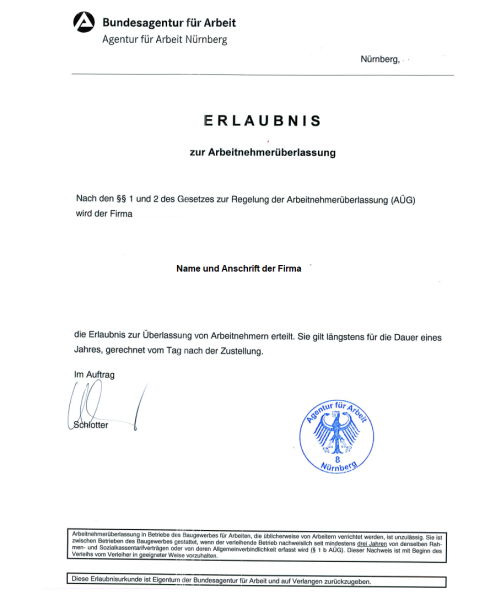Here you will find comprehensive information and legal background on employment agencies and the hiring out of employees. Whether you are a foreign company that wants to set up a recruitment agency in Germany or you need a license to hire out employees – we offer you sound advice and practical support. Find out more about the legal requirements, the application process and the advantages of professional legal advice in this area.
Recruitment and Employee Leasing: A Comprehensive Overview
Introduction
Recruitment and employee leasing are two central components of the German labor market that offer flexible solutions for both companies and job seekers. While recruitment aims to directly connect job seekers with potential employers, employee leasing allows companies to temporarily employ staff to balance short-term demand fluctuations. This article examines the legal framework, processes, and benefits of both systems.
Definitions and Basics
Recruitment
Recruitment encompasses all activities aimed at matching job seekers with potential employers. This can be done through public institutions such as the Federal Employment Agency or private recruitment agencies. The process often includes identifying job seekers, assessing their skills and qualifications, applying for open positions, and supporting interviews and contract negotiations.
Employee Leasing
Employee leasing, also known as temporary work or agency work, is a triangular relationship between the temporary employment agency, the employee, and the hiring company. The employee signs an employment contract with the temporary employment agency but works in another company. This model allows companies to flexibly respond to changes in personnel needs without making long-term commitments.
Legal Framework
Recruitment
Recruitment in Germany is regulated by the Social Code III (SGB III). Private recruitment agencies need a permit from the Federal Employment Agency to operate legally. This permit is granted only if certain conditions are met, including:
- Proof of the reliability of the recruiter
- Professional suitability and qualifications
- Appropriate business premises and equipment
The Federal Employment Agency monitors compliance with these regulations and can impose sanctions for violations, including revoking the permit.
Employee Leasing
The legal basis for employee leasing is the German Employee Leasing Act (Arbeitnehmerüberlassungsgesetz, AÜG). This law regulates the rights and obligations of temporary employment agencies, temporary workers, and hiring companies. Key aspects of the AÜG include:
- Permit Requirement: Temporary employment agencies need a permit from the Federal Employment Agency to operate.
- Equal Treatment Principle: Temporary workers are generally entitled to the same essential working conditions as comparable permanent employees of the hiring company.
- Maximum Assignment Duration: The assignment of an employee to a hiring company is limited to a maximum of 18 months.
- Information Obligations: Temporary employment agencies must inform temporary workers about their rights and document this in writing.
Registration and Permitting
Registering as a Recruitment Agency
To operate as a recruitment agency, you must register with the Federal Employment Agency. The process includes several steps:
- Application Submission: Submit an application for a permit as a private recruitment agency to the Federal Employment Agency.
- Document Review: The Federal Employment Agency reviews the submitted documents, including proof of reliability and professional suitability.
- Permit Issuance: If the review is positive, you will receive the permit and can start your operations.
Employee Leasing Permit
A separate permit is required for employee leasing. The process for obtaining this permit includes:
- Application Submission: Submit an application to the Federal Employment Agency with all necessary documents.
- Document Review: The Federal Employment Agency reviews the reliability, financial stability, and professional suitability of the applicant.
- Permit Issuance: After a positive review, the permit for employee leasing is issued, initially on a temporary basis, and can be extended indefinitely after successful completion of the temporary period.
Benefits and Challenges
Benefits of Recruitment
- For Employers: Companies benefit from quick access to qualified workers without conducting extensive recruitment processes themselves.
- For Job Seekers: Job seekers receive support in finding jobs, professional advice, and access to a broad network of potential employers.
Challenges of Recruitment
- Regulatory Requirements: Compliance with legal requirements and regular reviews by the Federal Employment Agency require continuous attention.
- Market Competence: To be successful, recruiters must have a deep understanding of the labor market and a broad network.
Benefits of Employee Leasing
- Flexibility for Companies: Companies can cover personnel needs flexibly and quickly respond to peaks in demand or production.
- Entry Opportunities for Workers: Temporary workers gain the opportunity to gain work experience and prove themselves in different companies, which can lead to permanent employment.
Challenges of Employee Leasing
- Legal Requirements: Compliance with the AÜG and associated regulations, such as the equal treatment principle and maximum assignment duration, requires careful planning and management.
- Image Problems: Temporary work often has a negative public image, which can make recruiting qualified staff more difficult.
Practical Implementation and Best Practices
Best Practices for Recruitment
- Network Building: Build and maintain an extensive network of employers and job seekers.
- Quality Management: Implement a quality management system for continuous improvement of recruitment processes.
- Continuing Education: Regular training and continuing education for staff to stay informed about current developments in labor law and the labor market.
Best Practices for Employee Leasing
- Compliance Management: Establish a compliance management system to ensure compliance with all legal requirements and avoid sanctions.
- Employee Support: Set up a comprehensive support system for temporary workers, including regular consultations and assistance with career development.
- Transparent Communication: Open and transparent communication with all parties to build trust and avoid misunderstandings.
International Perspectives and Cooperation
Cross-Border Recruitment
Recruitment and employee leasing are not limited to national borders. Many companies seek international talent. Important aspects include:
- Recognition of Qualifications: Recognition of foreign degrees and work experiences is essential for successful placement.
- Legal Frameworks: Differences in labor law systems must be considered to avoid legal problems.
- Cultural Differences: Cultural differences can affect integration into the labor market and should be considered in the placement processes.
Cooperation with International Partners
To successfully manage international recruitment and employee leasing, cooperation with partners in other countries is crucial. This can be done through partnerships with foreign recruitment agencies, international organizations, or direct contacts with companies abroad.
Future Perspectives and Innovations
Digitalization in Recruitment
Digitalization offers numerous opportunities to improve recruitment and employee leasing. These include:
- Online Platforms: Use of online platforms to connect job seekers and employers.
- Artificial Intelligence: Use of AI to analyze applications and improve matching algorithms.
- E-Learning: Providing online training opportunities for job seekers to improve their qualifications.
Flexibilization of Labor Markets
The increasing flexibilization of labor markets requires new approaches in recruitment and employee leasing. These include:
- Freelancing and Gig Economy: Support for freelancers and project workers through specialized placement platforms.
- Hybrid Work Models: Promotion of hybrid work models that allow flexible working hours and locations.
- Lifelong Learning: Promotion of lifelong learning to adapt to the constantly changing demands of the labor market.
Conclusion
Recruitment and employee leasing are essential components of the modern labor market. They offer flexible solutions for companies and job seekers and contribute to the stability and dynamics of the labor market. By complying with legal regulations and implementing best practices, recruitment agencies and temporary employment agencies can increase their efficiency and make a valuable contribution to the economy. The future challenges and opportunities lie in digitalization and the flexibilization of the labor market, which require innovative approaches and continuous adaptation.
For further information or legal support, we are at your service. Our expertise in this area ensures that you meet all requirements and thus ensure the safety and compliance of your services in the German labor market.

Lawyer, specialist lawyer for commercial and corporate law
Phone 0049 69 71672670
We are happy to provide you with comprehensive advice on employment law
Our specialist lawyers will be happy to advise you on all aspects of employment law, such as the drafting of employment contracts, dismissals, social security issues, etc.
Do you have questions about employment law? We will be happy to advise you briefly and without obligation.
Do you have any questions regarding the application for an employee leasing permit?
We will gladly advise you. Please send us a message or give us a call +49 69 71672670.
You can also directly mandate us to advise you and prepare an application for an employee leasing permit here.


